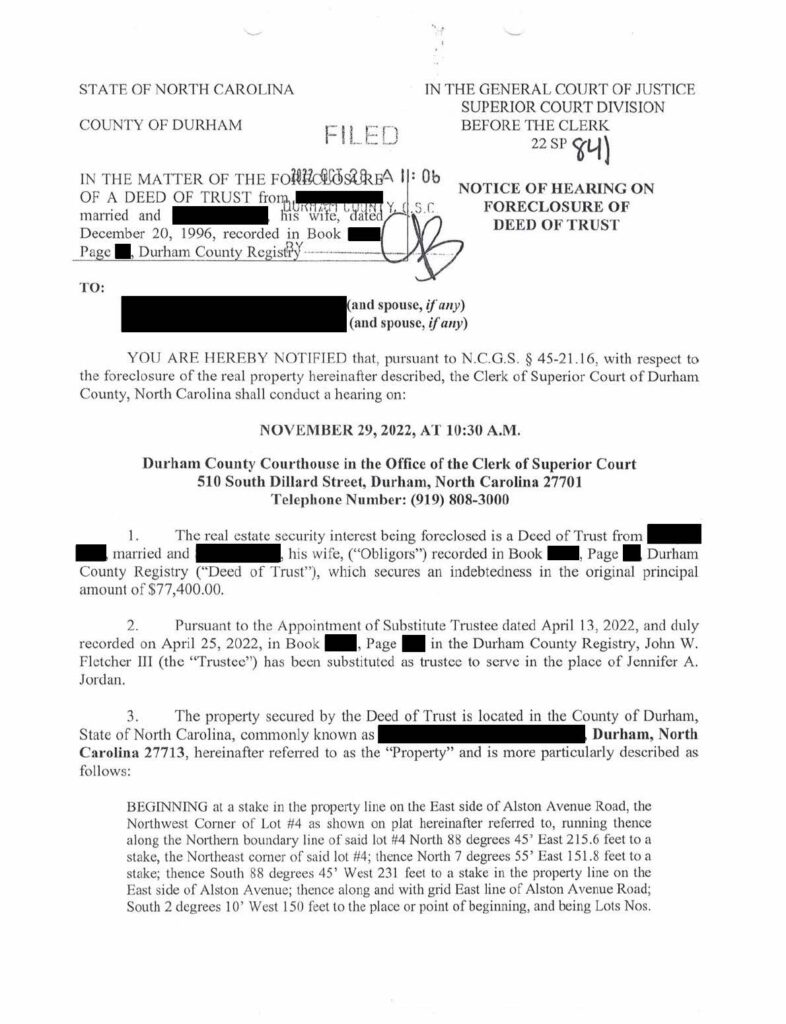If you are facing foreclosure, get legal advice right away.
The NC Justice Center offers free legal help and may be able to assist you.
Click here for information on how to apply for legal assistance.
Q: What is a foreclosure, and why does it happen?
A: The most common type of foreclosure occurs when a homeowner is unable to make payments on his or her mortgage loan. In that event, the lender may file a court action to take back possession of the home. If the company is allowed by the court to take back possession of the home, it will then sell the home at a foreclosure auction and use the money from the sale to pay off what is owed on the loan.
Q: Can a foreclosure occur if I fall behind on my property taxes or homeowners’ association (HOA) fees?
A: Yes. If you fall behind on your property taxes, the county where you live can bring a court action to take possession of your home and then sell it at a foreclosure auction to pay off what you owe. The same is true if you fall behind in your HOA assessments. The HOA can get a court order that allows it to sell your home if you fail to pay your HOA assessments, even if you are not behind on your mortgage loan.
Q: What should I do if I can’t pay my mortgage, property taxes, or HOA fees?
A: Seek help from a HUD-approved housing counselor or a lawyer as soon as possible. Depending on your situation, you may be able to obtain a loan modification to bring your mortgage loan current or enter into a payment plan to fix your delinquent property taxes or HOA fees. Even after a foreclosure is filed, you might still be able to stop it and save your home.
Q: Where can I find free help?
A: You can find a free housing counselor at www.hud.gov/findacounselor or by calling (800) 569-4287. A counselor can help you explore options like a loan modification to avoid foreclosure.
For free legal help in North Carolina, call Legal Aid at (866) 219-5262 or the NC Justice Center at (919) 856-2162.
Q: Someone is offering to buy my house for cash. Is this a good idea?
A: Be careful with quick “cash” offers. These offers are usually much lower than the actual value of your home. While selling your home might be an option, always get legal advice first. Don’t sign anything without talking to a lawyer.
Scammers may offer cash and promise extra time to stay in your home, but they could end up taking your money and your home. Learn more about foreclosure scams from the NC Department of Justice here.
Q: How does the foreclosure process work?
A: The foreclosure process follows a series of steps:
- Pre-Foreclosure Notice: For home loans, the mortgage company must send you a notice at least 45 days before starting foreclosure.
- Notice of Hearing: This is the official start of a foreclosure action in court. The notice provides information about the foreclosure, including your right to attend the hearing and to raise defenses. The Notice of Hearing must be served on you properly to be effective. Seek legal help as soon as you get this notice. Here is a sample of what a Notice of Hearing looks like.

- Foreclosure Hearing: The initial hearing is conducted by an assistant Clerk of Court or hearing officer at the courthouse, not by a judge.
- At the hearing, you can ask for the foreclosure process to be paused for up to 60 days if you can show that there is a reasonable chance that the extra time would allow you to resolve the problem that led to the foreclosure. For example, you might be working with a housing counselor to apply for a loan modification that would cure the default.
- You might also be able to raise defenses to the foreclosure.. A lawyer can help determine if you have valid defenses. Free legal help is available in NC.
- Foreclosure Order: If the hearing officer decides that the party bringing the foreclosure action has satisfied all the requirements for obtaining a foreclosure order, a foreclosure sale date will be scheduled.
- Appeal: You have only 10 days to appeal the foreclosure order. You will need to pay a small bond to stop the foreclosure sale from going forward during the appeal. The appeal will be heard by a Superior Court judge.
Q: Can I stop the foreclosure sale?
A: Yes, you can stop the foreclosure sale by:
- Paying all money owed, including foreclosure costs.
- Filing for bankruptcy.
- Filing an affirmative legal action under G.S. 45-21.34 to stop the foreclosure sale
 Justice Circle
Justice Circle